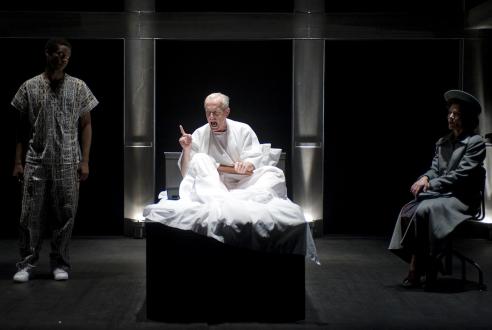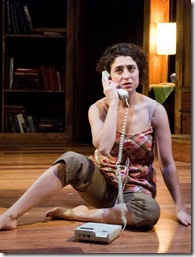I’m filing two Wall Street Journal drama columns from Chicago this week. In today’s paper, I report on the Court Theatre’s revival of Angels in America and Next Theatre Company’s production of Amy Herzog’s After the Revolution, in both cases with high enthusiasm. Here’s an excerpt.
* * *
 Like it or not, Tony Kushner’s “Angels in America” is a landmark of postwar American theater. Opportunities to see it onstage are sufficiently rare that they should be seized with alacrity–especially in the case of the Court Theatre’s new production, which is a landmark in its own right. Charles Newell, the Court’s artistic director, has a knack for creating tightly focused small-scale productions of such sprawling works as “Porgy and Bess.” His galvanically staged version of “Angels in America” is very much in the same vein. Performed in the company’s 250-seat thrust-stage house, it puts Mr. Kushner’s desperate characters so close to the audience that their fear and trembling becomes as immediate as a whispered confession.
Like it or not, Tony Kushner’s “Angels in America” is a landmark of postwar American theater. Opportunities to see it onstage are sufficiently rare that they should be seized with alacrity–especially in the case of the Court Theatre’s new production, which is a landmark in its own right. Charles Newell, the Court’s artistic director, has a knack for creating tightly focused small-scale productions of such sprawling works as “Porgy and Bess.” His galvanically staged version of “Angels in America” is very much in the same vein. Performed in the company’s 250-seat thrust-stage house, it puts Mr. Kushner’s desperate characters so close to the audience that their fear and trembling becomes as immediate as a whispered confession.
No small part of the credit for the potency of this production belongs to John Culbert, the scenic designer, who has shunned hospital-room naturalism in favor of an aggressively simple unit set (the centerpiece is a catafalque-like platform, the backdrop a grid of girders) that seems to float in the midst of infinite space. The sound design, by Joshua Horvath and Kevin O’Donnell, heightens to an alarming degree the atmosphere of encroaching disaster. Everything else is left to the imagination–and to Mr. Newell’s cast, led by Larry Yando as Roy Cohn. By turns horrifically gleeful and unexpectedly vulnerable, Mr. Yando’s Cohn steers clear of caricature, thus mitigating Mr. Kushner’s tendency to demonize his villains….
 What would you do if you found out that your grandfather had been a Soviet agent–and that your family had lied to you about it? In “After the Revolution,” the 2010 “prequel” to “4000 Miles,” Amy Herzog asks this question, and the answer she gives, although fictionalized, is intensely personal. That stands to reason, since something closely similar happened to Ms. Herzog, whose grandfather was revealed in 2000 to have spied for the Russians during World War II.
What would you do if you found out that your grandfather had been a Soviet agent–and that your family had lied to you about it? In “After the Revolution,” the 2010 “prequel” to “4000 Miles,” Amy Herzog asks this question, and the answer she gives, although fictionalized, is intensely personal. That stands to reason, since something closely similar happened to Ms. Herzog, whose grandfather was revealed in 2000 to have spied for the Russians during World War II.
Ms. Herzog has turned this harrowing experience into an incisive, impressively honest play about life in a red-diaper family. As in “4000 Miles,” which is playing at New York’s Lincoln Center Theater through June 17, she manages with near-miraculous skill to embed personal drama in a political framework, adding sparkle to the action with deft touches of satire….
This staging, finely directed by Kimberly Senior, features a letter-perfect performance by Christine Stulik as Emma Joseph, the starchily self-righteous young political activist who is jolted to the marrow when she learns the ugly truth about her grandfather….
* * *
Read the whole thing here.
Archives for 2012
TT: Snapshot
Charles and Ray Eames are interviewed by Arlene Francis on NBC’s Home in 1956:
(This is the latest in a series of arts-related videos that appear in this space each Monday and Wednesday.)
TT: Almanac
“The secret of success is never believing you are successful.”
Jeffrey Archer (quoted in Martyn Lewis, Reflections on Success)
THE INCREDIBLE SHRINKING CONDUCTOR
“In February, the New York Philharmonic announced its 2012-13 season, the orchestra’s fourth under the leadership of Alan Gilbert, whose appointment as music director was the source of much favorable press when it was announced in 2007. No such reaction greeted the news that the Philharmonic would be offering its audiences, among other things, a four-concert Bach series, the symphonies and concertos of Brahms, and a concert version of the Rodgers and Hammerstein musical Carousel. Outside of the usual pro forma story in the New York Times, the silence was deafening…”
TT: After the fact
Mrs. T and I are in Chicago this week, and I’m going to be busy throughout our stay there, so in lieu of blogging today, I’m posting a video interview that I did in 2009. The occasion was the publication of Pops: A Life of Louis Armstrong. The interview was conducted by the folks at Big Think, an exceedingly interesting website that is insufficiently well known.
Big Think recently posted this interview on YouTube. If you didn’t happen to see it in 2009, you might possibly be interested in seeing what I had to say back then:
TT: Lookback
 From 2004:
From 2004:
Since we’re on the subject of me, my brother and his daughter were looking at Smalltown High School yearbooks at the dinner table last night, some of which were published back when I edited the high-school newspaper. That was–gulp–30 years ago. As my niece made fun of the hair styles of 1974, I found myself recalling some of the ways in which I first became aware of the larger world of art and culture, and it occurred to me that in lieu of a more formal chronicle, it might be interesting to draw up a list of cultural firsts….
Read the whole thing here.
TT: Almanac
“What makes the vanity of others insufferable to us is that it wounds our own.”
François de La Rochefoucauld, Reflections; or Sentences and Moral Maxims, Maxim 389.
TT: A fugitive tweet
When life gets complicated, craftsmanship is a refuge.
